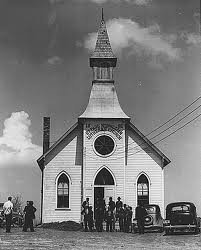
North Carolina Church records can be a rich source of information for the genealogical and historical researcher. In many parts of North Carolina, church records predate civil records. They for this reason record vital occurrences, supplying birth, marriage, and death facts which may otherwise be lost. Apart from furnishing names and dates, church records may expose associations between people and portray a family’s standing in the community. In addition, entries of a personal nature are not unheard of, and these can provide you with a glimpse into an ancestor’s identity or habits.
Before North Carolina County and city governments compiled vital records, many people documented crucial times, events, and names in their family Bible. Family Bibles are helpful research tools. Despite the fact that the dates are not guaranteed, Family Bibles are a tangible link with past generations.
Quaker missionaries named George Fox and William Edmundson came to the area in 1672, bringing the Society of Friends, which is what the Quakers called themselves, to North Carolina. Soon, Quakers came from Maryland, Pennsylvania, and Virginia, making them one of the biggest religious groups in the area throughout the 1700s and 1800s. However, most Quakers had migrated to Ohio by the time the Civil War began because they were against both conflict and slavery.,
The Guilford College Library, which is located in the North Carolina city of Greensboro, has a large collection of Quaker documents on file. That includes original monthly meeting records and minutes. There are 6000 volumes in that collection and the information covered spans from 1680 to the present day. Early North Carolina Yearly Meeting and related monthly meeting records from Georgia, East Tennessee, and South Carolina are also part of that collection.
Church of England: In 1700 the Church of England became the second denomination to gain a foothold in North Carolina. Several years after the American Revolution ended they became known as Episcopalians, instead. There are no known surviving records from the Church of England parishes that were in North Carolina in the 1700s.
Moravians: The Moravians were also called the United Brethren. They came from Pennsylvania and bought around 100,000 acres of North Carolina land in 1753. That land then became known as “Wachovia.” They established the towns of Salem, Bethabara, and Bethania. They kept their records well. Researchers can obtain copies of many of those records by contacting Moravian Archives, Southern Province of the Moravian Church in America, Drawer M, Salem Station, Winston-Salem, NC 27108. Their holdings include manuscripts and historical books, as well as other Moravian documents.
Baptists: In the middle of the 1700s Baptists came to North Carolina. In 1755 they established the Sandy Creek Church, which later became known by the nickname “Mother of Southern Baptist Churches.” For approximately 200 years the Baptists became the most prominent North Carolina religious denomination. Many different churches split from the original Baptist church and records may vary, but do contain a lot of useful information.
The biggest collection of Baptist records for North Carolina is located at Wake Forest University in the Baptist Historical Collection of the Z. Smith Reynolds Library.
Other Denominations: North Carolina is now home to many different religious groups, but there were only a small handful in the state’s early days. Tin the 1700s and 1800s those included the groups above, as well as the Lutherans and the Presbyterians.
The Highland Scots brought Presbyterianism to the area in the 1730s, when they settled near the Cape Fear River. The Scots-Irish who settled in the area from Virginia and Pennsylvania were also Presbyterians. The Presbyterian Historical Foundation, P.O. Box 847, Montreat, NC 27410 can provide historical information on those groups.
The Germans who settled in Pennsylvania in the early 1700s were Lutherans. They later moved into North Carolina through the Shenandoah Valley of Virginia. They then joined the Spotsylvania and Orange County Germanna colonists’ descendants. Information on those groups can be obtained from the Archives of the North Carolina Synod, P.O. Box 2049, Salisbury, NC 28144.
North Carolina Church and Bible Links
- North Carolina Christenings, 1866-1964 (familysearch.org)
- Inventory of the church archives of North Carolina.
- North Carolina Church Books (amazon.com)
- North Carolina Bible Records
- North Carolina Bible Books (amazon.com)
